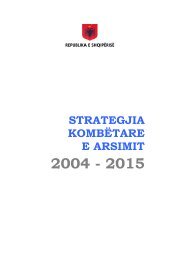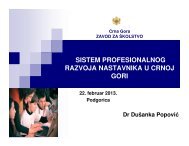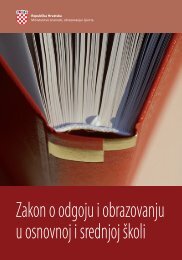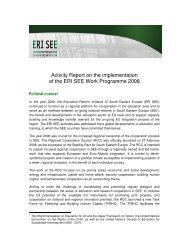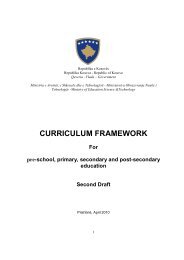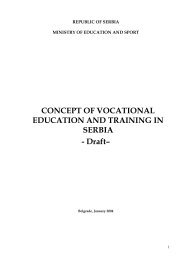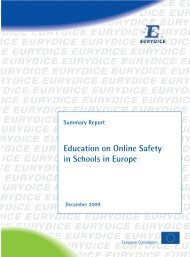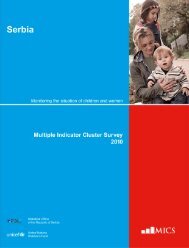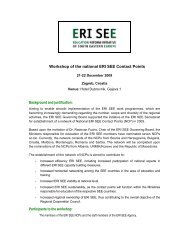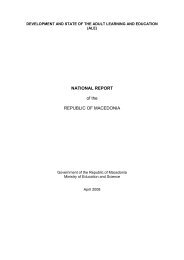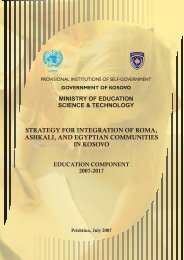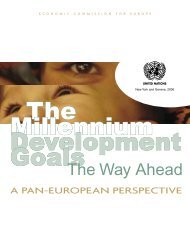only secondary education diplomas due to lack of c<strong>and</strong>idates with university degrees. 36While regular professional development training recommended by <strong>the</strong> Serbian Ministry ofEducation is provided in Serbia, most teachers cannot afford to participate, especially when<strong>the</strong>re is a tuition fee <strong>and</strong> transport <strong>and</strong> accommodation are not reimbursed. The fact that mosthigh school graduates are able to enrol at higher education institutions outside of <strong>Kosovo</strong> isconsidered as an indicator of teaching quality. <strong>Kosovo</strong> Bosniaks in Mitrovicë/Mitrovica areconcerned about <strong>the</strong> preservation of <strong>the</strong>ir cultural <strong>and</strong> religious identity under <strong>the</strong> Serbiancurriculum <strong>and</strong> dem<strong>and</strong> enhanced training <strong>and</strong> sensitivity of teachers <strong>and</strong> school managementto <strong>the</strong> specificities of <strong>the</strong>ir culture. <strong>Kosovo</strong> Bosniak <strong>and</strong> Gorani students wishing to becometeachers can pursue tertiary education in Pejë/Peć <strong>and</strong> Prizren, where <strong>the</strong> local branches ofPrishtinë/Priština University offer faculty courses in Bosnian.There are only a few teachers of Romani language in Serbian curriculum schools in nor<strong>the</strong>rnMitrovica/Mitrovicë, Ugljare/Uglar (Fushë Kosovë/<strong>Kosovo</strong> Polje), Janjevë/Janjevo(Lipjan/Lipljan), Gjilan/Gnjilane <strong>and</strong> Kamenicë/Kamenica. No training specific to <strong>the</strong>irlanguage <strong>and</strong> subject of teaching is available. The fact that most Roma students inGjilan/Gnjilane region only complete <strong>primary</strong> education (in ei<strong>the</strong>r Serbian or Albanian) ordrop out of school before completing <strong>the</strong>ir education is an obstacle towards <strong>the</strong> training ofqualified Roma teachers. Roma students who wish to attain tertiary degrees often cannotafford it or rely on scholarships, <strong>and</strong> frequently enrol at Serbia or <strong>the</strong> former YugoslavRepublic of Macedonia universities for reasons of linguistic proficiency. Fur<strong>the</strong>rmore,employed Roma teachers do not benefit from many in-service training opportunities, as suchtrainings are not provided in <strong>Kosovo</strong> in Romani language, <strong>and</strong> it is extremely difficult for<strong>the</strong>m to attend <strong>the</strong> trainings in Romani language provided by <strong>the</strong> Serbian Ministry ofEducation.<strong>Kosovo</strong>-curriculum schoolsIn 2008, <strong>Kosovo</strong> Albanian parents in Zvečan/Zveçan <strong>and</strong> Leposavić/Leposaviq complainedabout <strong>the</strong> quality of <strong>the</strong> education <strong>and</strong> teachers’ outdated pedagogical techniques at <strong>the</strong><strong>Kosovo</strong> curriculum school of Boletin/Boljetin. These students have generally lowerperformance <strong>and</strong> often drop out of education when attending secondary schools in sou<strong>the</strong>rnMitrovicë/Mitrovica. While municipal authorities north of <strong>the</strong> Ibër/Ibar river do not supporteducation under <strong>the</strong> <strong>Kosovo</strong> curriculum, <strong>the</strong> Ministry of Education failed to providepedagogical training for Albanian language teachers in <strong>Kosovo</strong> curriculum schools innor<strong>the</strong>rn <strong>Kosovo</strong>. In 2008, a <strong>Kosovo</strong> Education Centre’s training funded by <strong>the</strong> <strong>OSCE</strong>brought visible improvement of pedagogical techniques <strong>and</strong> educational st<strong>and</strong>ards.In Gjilan/Gnjilane region, municipal authorities <strong>and</strong> school managers often mention <strong>the</strong> lackof qualified mo<strong>the</strong>r tongue teachers <strong>and</strong> <strong>the</strong> low number of <strong>non</strong>-<strong>majority</strong> community studentsas reasons for <strong>the</strong> absence of education in <strong>non</strong>-official languages. 37 However, <strong>the</strong> lack ofqualified mo<strong>the</strong>r tongue teachers is a major obstacle to high quality education even inmunicipalities where <strong>the</strong> education in <strong>non</strong>-official languages is provided.<strong>Kosovo</strong> curriculum schools in Mitrovicë/Mitrovica have an insufficient number of Bosnianmo<strong>the</strong>r tongue teachers. Lessons in Bosnian are also provided by <strong>Kosovo</strong> Albanian teachersproficient in this language. Classes are organised even if <strong>the</strong> number of students is below <strong>the</strong>36 In <strong>the</strong> Serbian curriculum school of Janjevo/Janjevë, 18 out of 20 teachers have secondary educationdiplomas.37 Ferizaj/Uroševac, Novobërdë/Novo Brdo, Štrpce/Shtërpcë <strong>and</strong> Viti/Vitina do not provide education or weeklyclasses in a <strong>non</strong>-official language. Roma students attend <strong>the</strong> Serbian curriculum in all municipalities with <strong>the</strong>exception of Ferizaj/Uroševac <strong>and</strong> few students in Kamenicë/Kamenica.9
minimum required. 38 Shortage of qualified teachers creates a serious need for training <strong>and</strong>improvement of education skills in all languages. In <strong>the</strong> Pejë/Peć <strong>Kosovo</strong> curriculumsecondary school of economics, 80 out of 1,600 students are <strong>Kosovo</strong> Bosniaks. There are 13qualified <strong>Kosovo</strong> Bosniak teachers, <strong>non</strong>e of whom teach community-specific “national”subjects as <strong>the</strong>se are not <strong>the</strong>ir field of expertise. This contributes to lack of communityspecific“national” subject education. In Prizren, <strong>Kosovo</strong> Bosniak, Ashkali <strong>and</strong> Egyptianteachers participate in a training supported by <strong>the</strong> Ministry of Education. Training isgenerally conducted in Albanian (<strong>and</strong> in some cases in Bosnian).,In <strong>the</strong> first case,interpretation is provided but teachers are dissatisfied with its quality.Training sessions for <strong>Kosovo</strong> Turk teachers are sponsored by <strong>the</strong> Ministry of Education <strong>and</strong>by <strong>the</strong> Turkish government <strong>and</strong> offered in Albanian with simultaneous interpretation.Teachers stress that <strong>the</strong> training would improve if it were to be delivered directly in Turkish.Approximately 90 per cent of <strong>the</strong> <strong>Kosovo</strong> Turk teachers in Prizren have an adequateacademic background <strong>and</strong> qualifications, while in Gjilan/Gnjilane, <strong>the</strong>y are not enough tocover all grades, classes <strong>and</strong> subjects. Hence, <strong>the</strong>re are teachers teaching more than onesubject – although <strong>the</strong>y are not qualified to do so – or teachers who do not have <strong>the</strong> necessaryqualifications to teach at all. Students wishing to become teachers in Turkish language enrolat <strong>the</strong> faculties of education in Prizren, Turkish philology in Prishtinë/Priština, or in Turkey.<strong>Kosovo</strong> Turk teachers in Mitrovicë/Mitrovica region provide education in <strong>the</strong> Albanianlanguage.In Obiliq/Obilić, <strong>the</strong> temporary community shelter school in Plementinë/Plementina provides<strong>the</strong> <strong>Kosovo</strong> curriculum in Albanian for Ashkali, Egyptian <strong>and</strong> Roma children. The threeAshkali <strong>and</strong> one Roma school teachers do not possess <strong>the</strong> required professionalqualifications, <strong>and</strong> nei<strong>the</strong>r <strong>the</strong> Ministry of Education nor <strong>the</strong> municipality have ensured <strong>the</strong>iraccess to professional training. In <strong>the</strong> Shtime/Štimlje schools, <strong>the</strong>re are approximately 150Ashkali pupils but only one Ashkali teacher.In both <strong>Kosovo</strong> <strong>and</strong> Serbian educational systems, school management positions are mainlykept by representatives of <strong>the</strong> respective <strong>majority</strong> community. Roma, Ashkali <strong>and</strong> Egyptiansare under-represented <strong>within</strong> teachers <strong>and</strong> not represented at <strong>the</strong> level of school management.The <strong>Kosovo</strong> Bosniak <strong>and</strong> <strong>Kosovo</strong> Turk <strong>communities</strong> lack sufficient managementrepresentation <strong>within</strong> mixed language schools, 39 but do have school management positionswhere education is conducted in <strong>non</strong>-official languages. 40 <strong>Kosovo</strong> Croat <strong>and</strong> <strong>Kosovo</strong>Albanian directors appointed by <strong>the</strong> municipality co-exist with a Serbian-curriculum <strong>Kosovo</strong>Serb director in <strong>the</strong> same school in Janjevë/Janjevo. 4138Article 2 of <strong>the</strong> Ministry of Education Administrative Instruction No. 16/2002 on Defining <strong>the</strong>Teacher/Student Ratio, provides that <strong>primary</strong> <strong>and</strong> secondary education classes have a minimum of 21students. This policy is lowered to 15 students per teacher for education in <strong>non</strong>-<strong>majority</strong> languages.39 In Prizren town, only one of <strong>the</strong> six <strong>primary</strong> schools providing education also in Turkish (Motrat Qirijazi) hasa <strong>Kosovo</strong> Turk deputy director. None of Prizren’s four secondary schools providing education in Turkish hasa <strong>Kosovo</strong> Turk manager. In <strong>the</strong> Zllapek/Zlopek (Pejë/Peć) school, most students <strong>and</strong> teachers are <strong>Kosovo</strong>Bosniaks, <strong>the</strong> co-ordinator is <strong>Kosovo</strong> Albanian. <strong>Kosovo</strong> Bosniak teachers of <strong>the</strong> <strong>primary</strong> schoolsPrapaqan/Prapaćane (Deçan/Dečane) <strong>and</strong> Dobrushë/Dobruša (Istog/Istok) are dissatisfied with <strong>the</strong>ir lack ofrepresentation.40In <strong>the</strong> mono-ethnic Bosnian language schools of <strong>the</strong> Župa/Zhupë valley (Prizren) <strong>and</strong> inVitomiricë/Vitomirica (Pejë/Peć) teachers <strong>and</strong> principals belong to <strong>the</strong> <strong>Kosovo</strong> Bosniak community.Directors of <strong>the</strong> <strong>primary</strong> <strong>and</strong> secondary schools in Mamuşa/Mamushë/Mamuša are <strong>Kosovo</strong> Turk. Althoughappointed by <strong>the</strong> municipality, directors of <strong>the</strong> schools in Restelica/Restelicë, Brod/Brod <strong>and</strong> Rapča/Rapqë(Dragash/Dragaš), where all or most of <strong>the</strong> student attend Serbian-curriculum education are all from <strong>the</strong>respective villages <strong>and</strong> are familiar with <strong>the</strong> community’s identity.41 The school has three different names: “Vladimir Nazor”; ”Janjevo”; <strong>and</strong> ”Shtefan Gjeqovi.”.10



